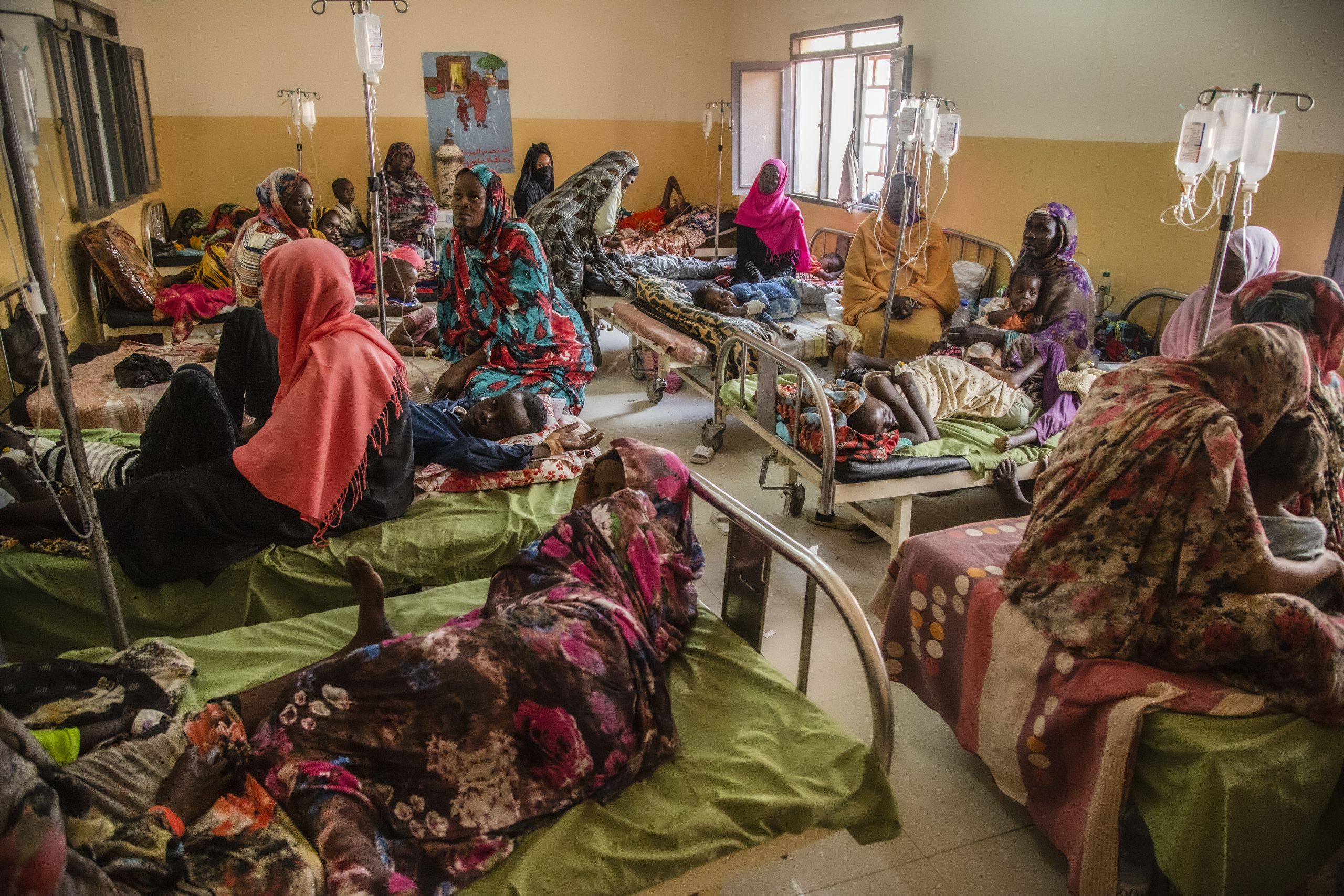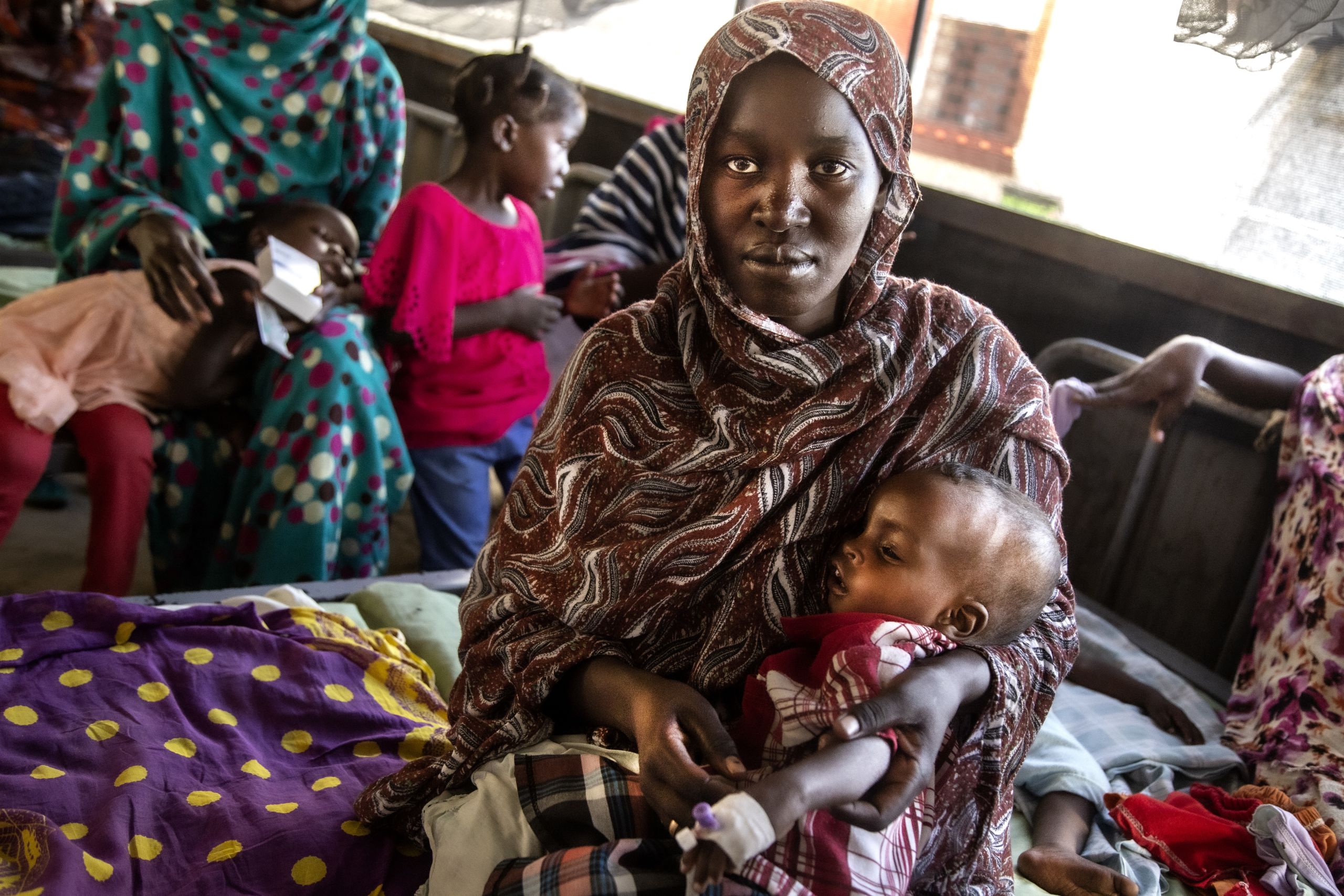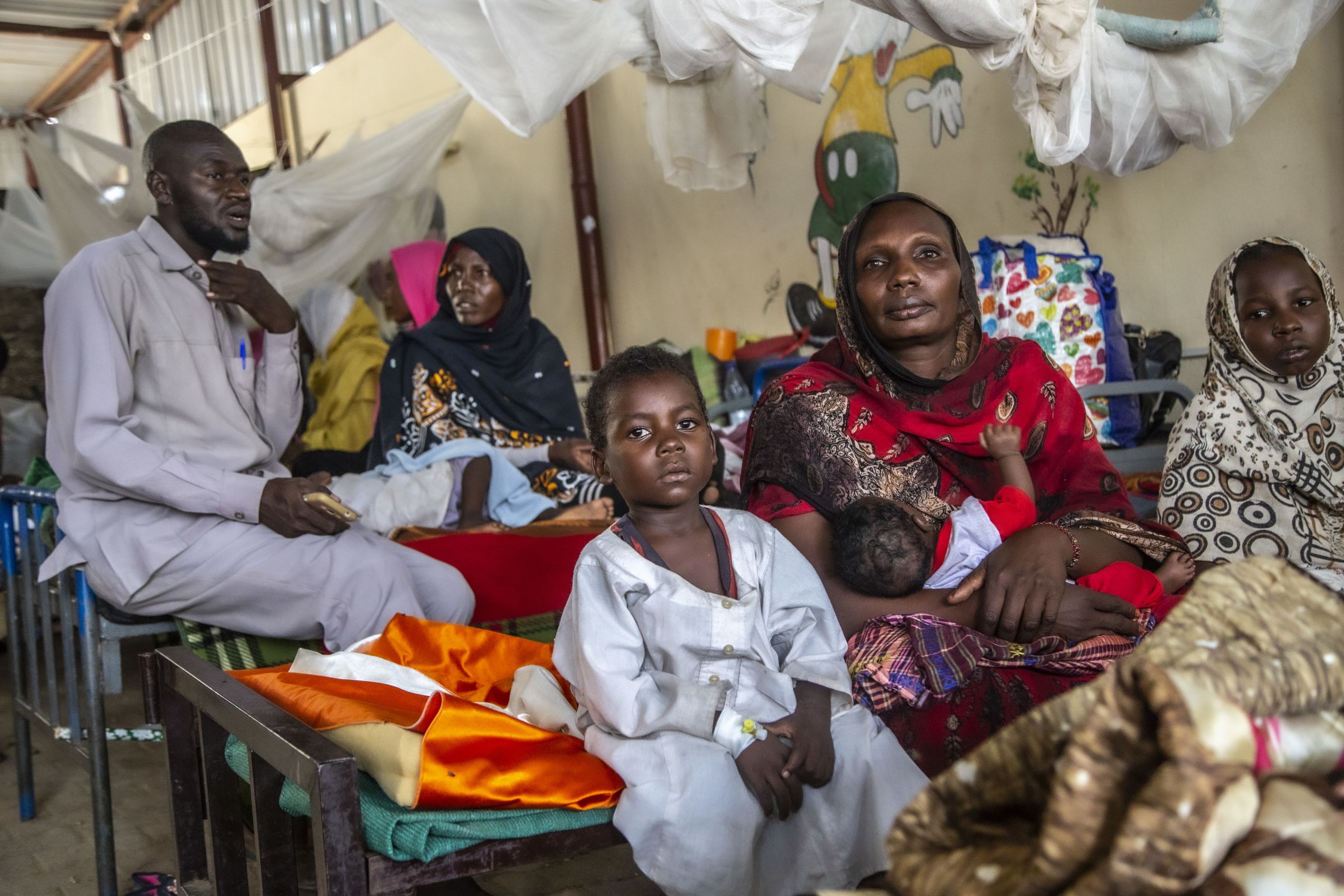Sudan
“I haven’t seen malaria like this in the past”

Ibrahim Ahmad Teshaq, 49, looks after one of his ten children, Mutawaquil Ibrahim, 9, who is severely ill with malaria. ©Igor G. Barbero / MSF
Ibrahim Ahmad Teshaq, 49, looks after one of his ten children, Mutawaquil Ibrahim, 9, who is severely ill with malaria. ©Igor G. Barbero / MSF
“My son was walking and, suddenly, he fell down”
Ibrahim Ahmad and Mutawaquil are from East Darfur, but have been displaced in El Fasher for nearly a decade. They live in a camp for internally displaced people five kilometres away.
My son was walking and, suddenly, he fell down. We were very worried as he didn’t speak for two days. His mother was losing patience. He was admitted to hospital five days ago. A doctor comes every half an hour to check his condition.
Alhamdolillah (God willing), he is improving and has started to talk again. I am very thankful to the medical team for treating my child and for providing free medications. If it wasn’t for MSF, I couldn’t afford to pay for the treatment as some drugs are very expensive.
Before the rainy season, I was given four mosquito nets for my whole family by an NGO, but the children got out of theirs during the night.
It has been raining too much this year and there are pools of water everywhere. Malaria is very dangerous and affects people very quickly. My child was about to die. Luckily, he is the only one in my family who got sick this time.
“Medicines are very expensive compared with what we can earn”
Husna Usman has lived in El Fasher since her childhood. Her family cultivates ground nuts and millet.
My child had a high fever and was having convulsions. I was worried about him and we came right away to the hospital – we didn’t waste any time. Today is our third day here and Mohamed is already improving. After testing positive for malaria, he was put on fluids and the treatment started.
This year, malaria is affecting many more people. I haven´t seen malaria like this in the past in El Fasher. I’ve had malaria twice, including this year. We have mosquito nets but not enough for everyone and two to three people sleep under each net.
The most important thing is to make preventive measures available and get free medication. My husband is a daily worker and sometimes works but other times he doesn’t. Medicines are very expensive compared with what we can earn.
Husna Usman Mohamed, 25, holds her child Mohamed Sami, nearly 2 years old. ©Igor G. Barbero / MSF
Husna Usman Mohamed, 25, holds her child Mohamed Sami, nearly 2 years old. ©Igor G. Barbero / MSF

Annie Kashung is MSF’s medical activity manager responding to the malaria outbreak in El Fasher, the capital of Sudan´s North Darfur state. She provides some insight into what is happening in response to four questions.


1
Why is the current malaria outbreak in El Fasher dangerous?

Malaria is a parasitic disease transmitted by a mosquito. It can be very dangerous if it is not treated promptly and properly, potentially resulting in death. People develop different symptoms including high fever, vomiting, abdominal pain and joint pain. In some severe cases, people can have hallucinations, can fall into a coma and become unconscious.
Sudan in general, and North Darfur state in particular, have a high burden of malaria with a seasonal peak during the rainy season. We usually monitor the situation, including in the state´s capital, El Fasher, one of the country’s most populated cities, which hosts a large number of internally displaced people. We’ve seen in the city this year that there has been a sharp increase in the number of cases, around double the number than during the same period in 2018.
A family, some of whose members have been admitted with malaria, sit in a ward of the Paediatrics hospital in El Fahser, in Sudan´s North Darfur state. ©Igor G. Barbero / MSF
A family, some of whose members have been admitted with malaria, sit in a ward of the Paediatrics hospital in El Fahser, in Sudan´s North Darfur state. ©Igor G. Barbero / MSF

2
What is MSF doing to respond to the outbreak?

Annie Kashung, MSF’s medical activity manager, checks the condition of a child who is being treated with intravenous antimalaria drugs at Paediatrics Hospital in El Fasher, capital of North Darfur state, Sudan. ©Igor G. Barbero / MSF
Annie Kashung, MSF’s medical activity manager, checks the condition of a child who is being treated with intravenous antimalaria drugs at Paediatrics Hospital in El Fasher, capital of North Darfur state, Sudan. ©Igor G. Barbero / MSF
MSF nurse supervisor Ahmed Abdalla checks on some patients admitted at the El Fasher Paediatrics hospital, in North Darfur state, Sudan. ©Igor G. Barbero / MSF
MSF nurse supervisor Ahmed Abdalla checks on some patients admitted at the El Fasher Paediatrics hospital, in North Darfur state, Sudan. ©Igor G. Barbero / MSF
Following the high increase of cases, at the end of September MSF decided jointly with the Ministry of Health to launch an emergency response. We are currently doing activities based in the two main referral health facilities of El Fasher: the Teaching hospital and the Paediatrics hospital. The aim is to strengthen the case management of malaria because it is very high and we are working 24/7. The average bed occupancy rate at the supported facilities has been 90 per cent above capacity over the last month. Sometimes there were three to four patients per bed in some wards. It was really congested, so we have set up tents to increase the bed capacity.
We have also strengthened the triage system according to the severity of the patients arriving (urgent, severe, stable) to avoid missing critical cases or treating them too late resulting in deaths.
We have also launched mobile activities on the outskirts of the city, in rural areas and in places where there are camps for internally displaced people, so we are targeting the root problem in the community and this will allow us to reduce the burden and the number of people in the hospital. Nearly 3,000 people have been treated for malaria through these outreach services.
Between the last week of September and the last week of November (both included), our teams have treated 26,787 cases of malaria in El Fasher, capital of North Darfur state, and surrounding areas. 3,002 out of these cases were severe. In the same period, 5,776 patients with malaria were admitted in the MSF supported hospitals in El Fasher. The bed occupancy rate has remained very high throughout the intervention. The number of admissions and cases treated is now finally decreasing.

3
Who is affected by malaria?

Malaria can target anyone. People are coming from different areas of the city and from surrounding villages. Women and men, locals and displaced people, and people of all age groups are affected.
The most vulnerable people are children under five years of age. These children are arriving really critically ill and, in some cases, you can see that a lot of family members have been affected by malaria. This is affecting them psychologically, emotionally and physically. Some people arrive unconscious, they can’t talk or walk.
On average, a child with severe malaria will stay between four to five days in hospital. The patient will start with intravenous malaria treatment depending on their weight. After 24 hours, we assess their status: if the patient can take oral tablets, then it will take them three more days to complete the dose.
A young boy who has almost recovered from malaria celebrates the improvement of his health in a ward of the Paediatrics hospital, in El Fasher, North Darfur, Sudan. ©Igor G. Barbero / MSF
A young boy who has almost recovered from malaria celebrates the improvement of his health in a ward of the Paediatrics hospital, in El Fasher, North Darfur, Sudan. ©Igor G. Barbero / MSF
Maha Mohamed Ababakar, 22, looks at her daughter Salma Ibrahim Javer, 7, who is recovering from malaria at the Paediatrics hospital in El Fasher, in Sudan´s North Darfur state. ©Igor G. Barbero / MSF
Maha Mohamed Ababakar, 22, looks at her daughter Salma Ibrahim Javer, 7, who is recovering from malaria at the Paediatrics hospital in El Fasher, in Sudan´s North Darfur state. ©Igor G. Barbero / MSF
“Many families in my village are affected by malaria”
Maha Mohamed her daughter Salma come from a farming village on the outskirts of El Fasher.
We came to the hospital yesterday at 8 am as there is no clinic in our village. My daughter had fever, a headache and felt sick. She tested positive for malaria. The support received has been good and, after one day, my daughter has begun to recover.
Many families in my village are affected by malaria. Nine out of 10 members of my family have already had it. I had malaria one month ago and I have gone through this disease four times in my life. This year I suffered more.
We were given a mosquito net last year, but this year nobody brought one. We have four nets for ten people at home. We feel the mosquito population is large. The weather is changing and the rainy season is lasting longer. Next to our house, there are pools full of water. Draining the water would help, but we would also like to get preventive medication to protect us from the mosquitoes.
The continuous rains are also ruining some of our crops, so the harvest will be smaller.

4
Which factors are causing the outbreak?

Patients chat in the malaria ward at the Paediatrics hospital in El Fasher, North Darfur, Sudan. ©Igor G. Barbero / MSF
Patients chat in the malaria ward at the Paediatrics hospital in El Fasher, North Darfur, Sudan. ©Igor G. Barbero / MSF
There are different contributing factors involved in this large outbreak of malaria. North Darfur and El Fasher continue to have a big number of internally displaced people living in precarious conditions in different camps.
The health facilities in the areas outside the city don’t have the same response capacity as those in the city and preventive measures implemented in the communities have often not been sustainable. While there have been distributions of mosquito nets, many households were not receiving enough, they received them late or were not using them properly.
The rainy season this year has been longer and heavier than in 2018; normally it ends in September, but this year it’s lasting into October. And we have a lot of stagnant water, which means a lot of mosquitoes breeding, and they carry the parasite that causes malaria.














